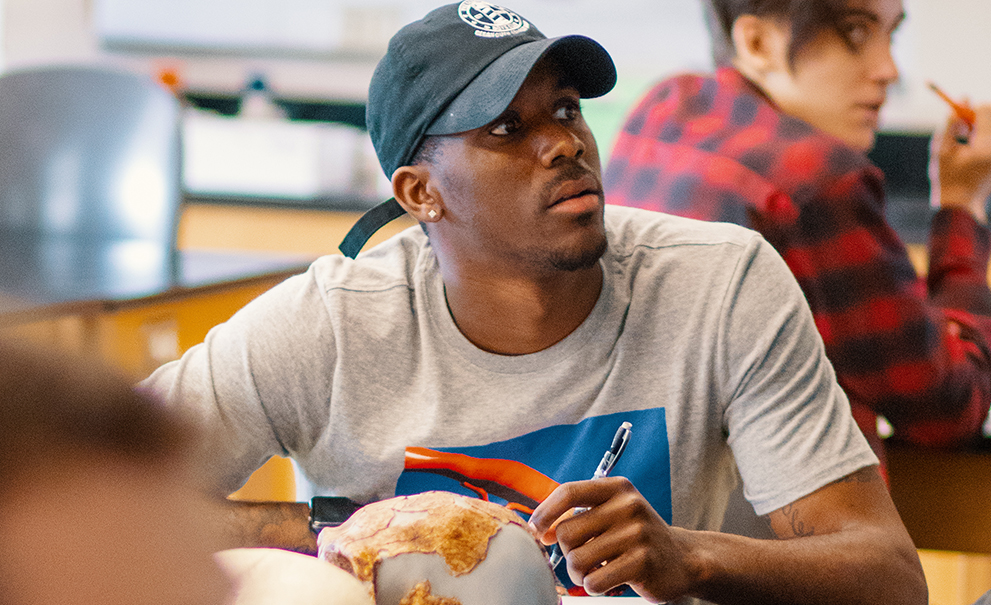Social Sciences
The Social Sciences help us understand the world beyond our immediate experience and explain how different societies work - from economies to feelings of happiness.
 Program Outcomes
Program Outcomes
Student learning is central to the college’s mission. All associate of arts, associate of science, and MRP/DTA degrees are designed to provide experiences that lead to the attainment of general education outcomes as embodied in the following student learning competencies:
Critical Analysis: the student effectively evaluates information and creates solutions through observation, reflection, reasoning, and experience.
Communication: the student effectively conveys information and ideas by adapting their communication style to different situations and audiences when speaking, writing, and listening to others.
Global Awareness & Cultural Competency: the student effectively engages with the multi-cultural world by studying the practices and perspectives of varying communities and cultures.
Information Literacy: the student effectively engages in a reflective process of inquiry to find, evaluate, use, and ethically create content.
Anthropology
Explore the four fields of anthropology - cultural anthropology, biological anthropology, archaeology, and linguistics. You'll receive unparalleled instruction and insight into human diversity, both biological and cultural, as well as human societies past and present around the globe.
History
Through the study of history students systematically examine the past and gain an opportunity to explore human nature and contemporary concerns. Historians work from the written records (cultural, economic, political, and scientific) of past generations to discover the kinds of lives led and problems faced.
Psychology
The Psychology program explores issues of human behavior and thought, provides the opportunity to gain a fuller understanding of yourself and others, and develops skills in human relations, communication, research, and analysis.
Sociology
When you take sociology classes at Centralia College, you will explore the answers to life's biggest questions and the social research tools used to study them. You’ll learn about how social forces have shaped your own and others’ lives, increase your social awareness and intercultural competence, and develop your critical thinking and analytical skills.
Anthropology
While preparing the student for further study and eventual employment in the field of anthropology, this educational plan also is relevant for students preparing for a broad range of jobs in both government and international agencies that focus on cross-cultural issues and involve working with people from different cultural backgrounds. These jobs, in addition to work in international and government agencies, might include working in agricultural development and educational reform or as a consultant, planner, market analyst, survey researcher, forensic scientist, or refugee coordinator.
For a detailed list of careers, opportunities, meetings, and up-to-date news in the field of anthropology, visit the American Anthropological Association.
Psychology
Emphasis in psychology provides preparation for a variety of careers, and will benefit students majoring in education, nursing, physical and occupational therapy, business, law, medicine, or other disciplines which deal with people.
Sociology
Sociology prepares students for a wide range of careers in fields such as social work, education, criminal justice, human resources/management, and social research. Visit the American Sociological Association’s website for more information on careers in sociology.
Degree Offered: Associate in Arts
Emphasis: Anthropology
Notes for Anthropology Students
- ANTH 260 or ANTH 290 the Anthropology Fieldtrip is strongly recommended.
- Anthropology majors are encouraged to develop a broad base in the social sciences to include: SOC& 101-Intro to Sociology, and PSYC& 100-General PsychologyorHIST& 116-Western Civilization I.
-
Students are required to complete 3-5 credits in a Diversity course (D). A list of courses that satisfy the Diversity Requirement can be found in the college catalog.
| First Year | |
| Fall Quarter |
|
| Winter Quarter |
|
| Spring Quarter |
*A language is strongly recommended. **MATH& 146 Intro to Statistics (M) is recommended. |
| Second Year | |
| Fall Quarter |
|
| Winter Quarter |
|
| Spring Quarter |
***HIST& 116 Western Civilization I is recommended for anthropology students desiring to specialize in archaeology. |
Degree: Associate in Arts
Emphasis: History
| First Year | |
| Fall Quarter |
|
| Winter Quarter |
|
| Spring Quarter |
|
| Second Year | |
| Fall Quarter |
|
| Winter Quarter |
|
| Spring Quarter |
|
* Recommended Humanities Courses: CMST& 220, ART 200, MUSC 139.
Degree: Associate in Arts
Emphasis: Sociology
Notes for Students
- Humanities: No more than five (5) units in performance/skills classes. No more than five (5) units in world language (many four-year institutions require 2-3 terms if high school requirement of two years not met). A world language is recommended.
- Electives: Minimum of twelve (12) elective units. A maximum of three (3) PE units may be included in the degree. No more than 12 units of non-academic electives.
| First Year | |
| Fall Quarter |
|
| Winter Quarter |
|
| Spring Quarter |
|
| Second Year | |
| Fall Quarter |
|
| Winter Quarter |
|
| Spring Quarter |
|
Degree: Associate in Arts
Emphasis: Psychology
Note for Students: Psychology majors are encouraged to develop a broad base in the social sciences.
| First Year | |
| Fall Quarter |
|
| Winter Quarter |
|
| Spring Quarter |
|
| Second Year | |
| Fall Quarter |
|
| Winter Quarter |
|
| Spring Quarter |
|
Centralia College has direct AA-degree transfer agreements with the following colleges:
- Bastyr University
- Central Washington University
- City University
- Cornish College of the Arts
- Eastern Washington University
- Gonzaga University
- Heritage University
- Northwest University
- Pacific Lutheran University
- Saint Martin’s University
- Seattle Pacific University
- Seattle University
- The Evergreen State College
- Trinity Lutheran College
- University of Washington
- Washington State University
- Western Washington University
- Whitworth College
Contact
|
Tobias R. Avalos (he/him/his) |
Dr. Rachel Bryant-Anderson (she/her/hers) |
